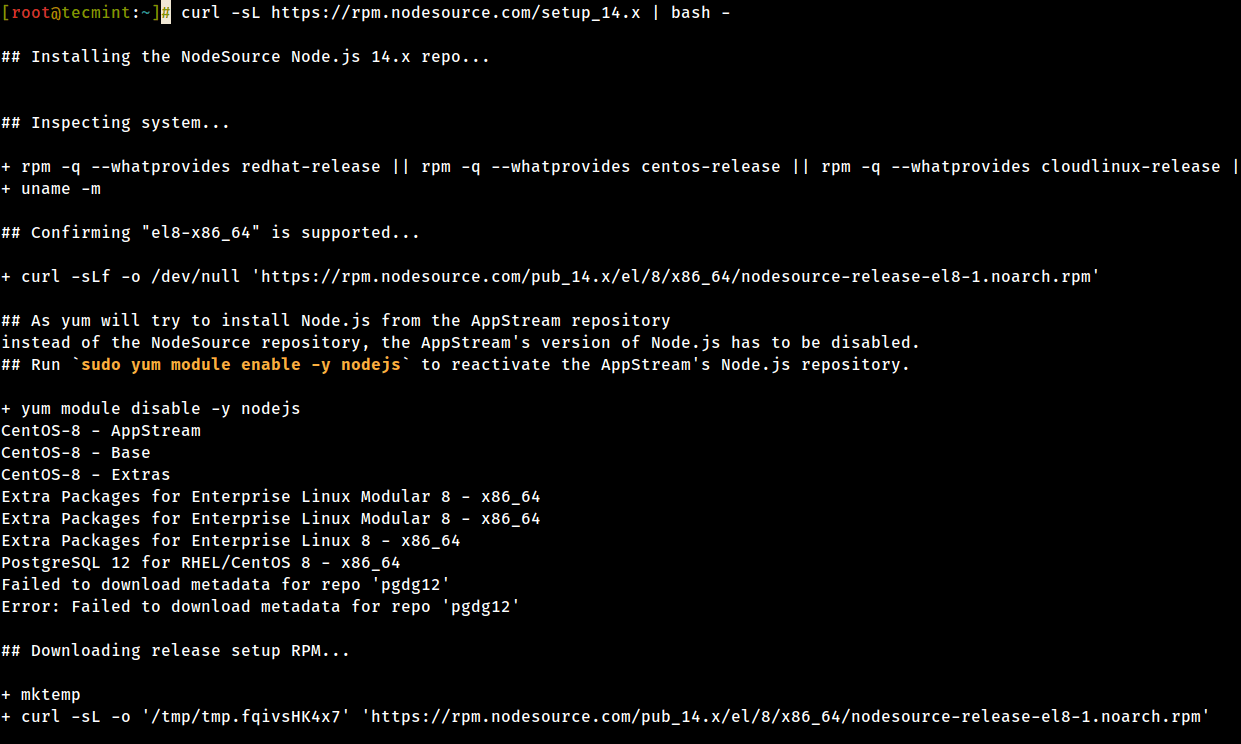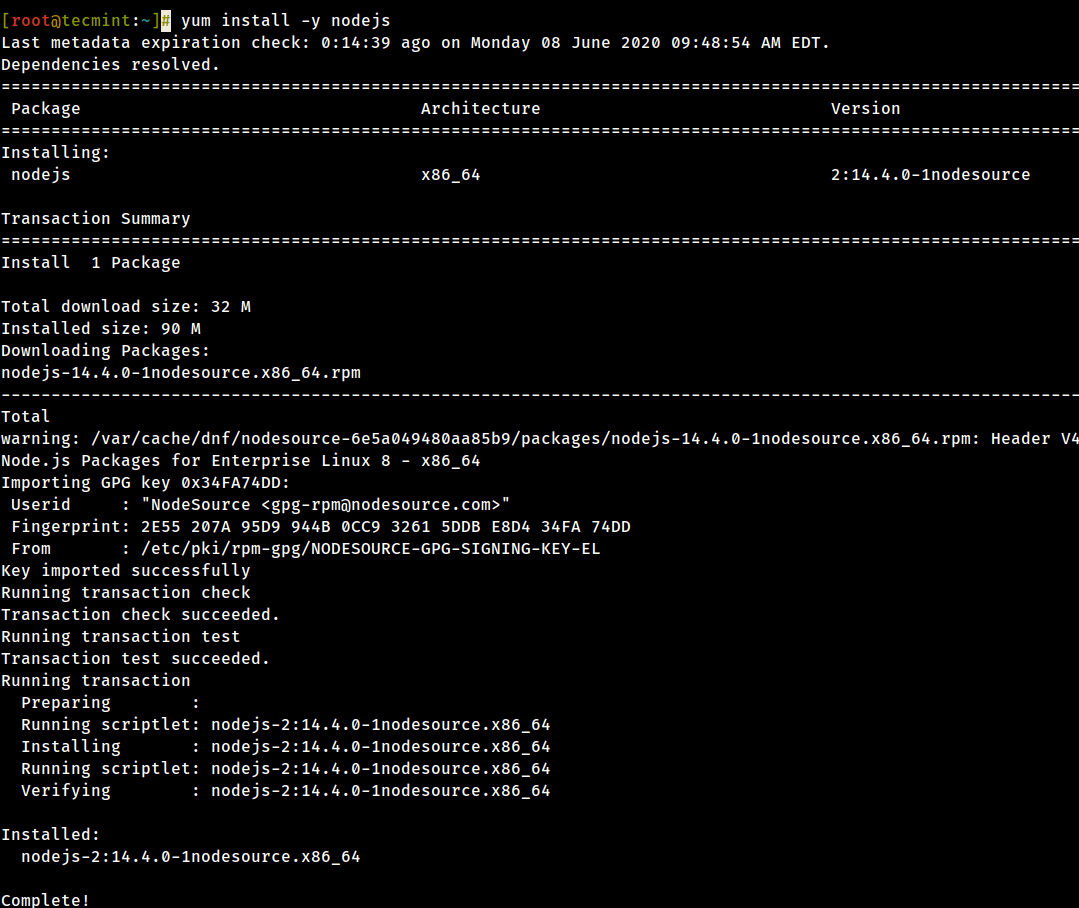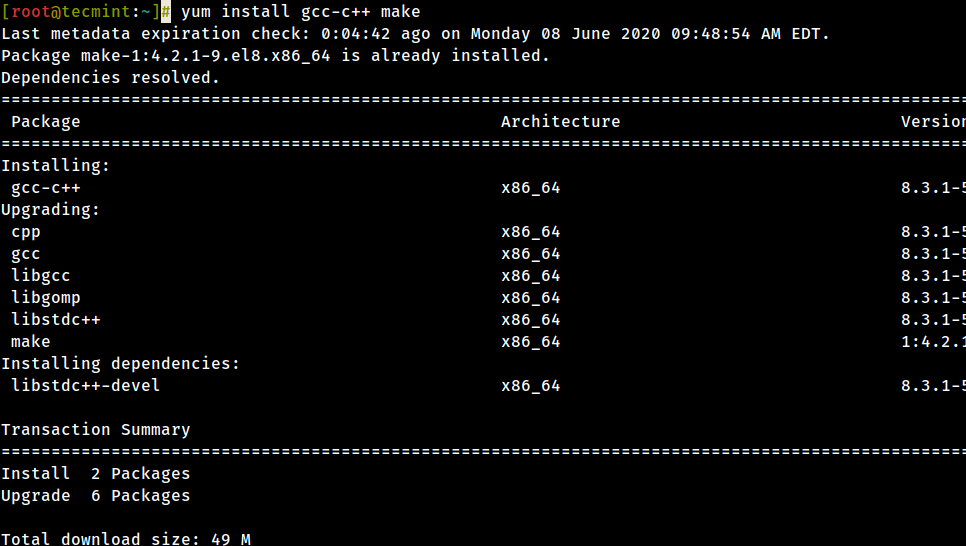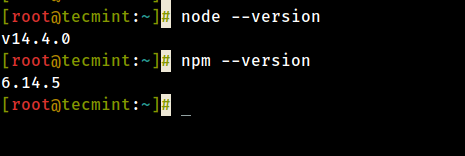How To Install Node 10 In Ubuntu
In this guide, we shall take a look at how you can install the latest version of Nodejs and NPM in RHEL, CentOS, Fedora, Debian, and Ubuntu distributions.
Read As well: NVM – Install and Manage Multiple Node.js Versions in Linux
Nodejs is a lightweight and efficient JavaScript platform that is built based on Chrome's V8 JavaScript engine and NPM is a default NodeJS package manager. You can apply it to build scalable network applications.
How to Install Node.js 14 in CentOS, RHEL, and Fedora
The latest version of Node.js and NPM is available from the official NodeSource Enterprise Linux repository, which is maintained by the Nodejs website and you will need to add it to your organisation to exist able to install the latest Nodejs and NPM packages.
Of import: If you are running an older release of RHEL six or CentOS vi, you might desire to read about running Node.js on older distros.
Installing NodeJS 14.ten in RHEL, CentOS and Fedora
To add together the repository for the latest version of Node.js 14.x, apply the following command as root or non-root.
-------------- As root user -------------- # curl -sL https://rpm.nodesource.com/setup_14.10 | bash - -------------- A user with root privileges -------------- $ curl -sL https://rpm.nodesource.com/setup_14.x | sudo bash -
Installing NodeJS 12.x on RHEL, CentOS and Fedora
If you desire to install NodeJS 12.ten, add the post-obit repository.
-------------- As root user -------------- # curl -sL https://rpm.nodesource.com/setup_12.ten | bash - -------------- A user with root privileges -------------- $ roll -sL https://rpm.nodesource.com/setup_12.ten | sudo bash -
Installing NodeJS 10.ten on RHEL, CentOS and Fedora
If y'all want to install NodeJS 10.x, add the post-obit repository.
-------------- Equally root user -------------- # ringlet -sL https://rpm.nodesource.com/setup_10.x | bash - -------------- A user with root privileges -------------- $ curl -sL https://rpm.nodesource.com/setup_10.ten | sudo bash -

Next, yous can now install Nodejs and NPM on your system using the control below:
# yum -y install nodejs OR # dnf -y install nodejs

Optional: There are development tools such as gcc-c++ and make that you need to have on your system, in order to build native addons from npm.
# yum install gcc-c++ make OR # yum groupinstall 'Development Tools'

How to Install Node.js fourteen in Debian, Ubuntu and Linux Mint
The latest version of Node.js and NPM is also available from the official NodeSource Enterprise Linux repository, which is maintained by the Nodejs website and you will demand to add together it to your system to be able to install the latest Nodejs and NPM packages.
Installing NodeJS xiv.ten in Debian, Ubuntu and Linux Mint
------- On Ubuntu and Linux Mint ------- $ curl -sL https://deb.nodesource.com/setup_14.10 | sudo -E bash - $ sudo apt-get install -y nodejs ------- On Debian ------- # curl -sL https://deb.nodesource.com/setup_14.10 | fustigate - # apt-get install -y nodejs
Installing NodeJS 12.10 in Debian, Ubuntu and Linux Mint
------- On Ubuntu and Linux Mint ------- $ curl -sL https://deb.nodesource.com/setup_12.x | sudo -E bash - $ sudo apt-get install -y nodejs ------- On Debian ------- # curl -sL https://deb.nodesource.com/setup_12.x | fustigate - # apt-go install -y nodejs
Installing NodeJS 10.ten in Debian, Ubuntu and Linux Mint
------- On Ubuntu and Linux Mint ------- $ ringlet -sL https://deb.nodesource.com/setup_10.10 | sudo -East bash - $ sudo apt-get install -y nodejs ------- On Debian ------- # curl -sL https://deb.nodesource.com/setup_10.x | bash - # apt-get install -y nodejs
Optional: In that location are development tools such as gcc-c++ and make that you need to have on your arrangement, in order to build native addons from npm.
$ sudo apt-get install -y build-essential
Testing Latest Nodejs and NPM in Linux
To have a simple test of nodejs and NPM, yous tin can just check the versions installed on your system past using the following commands:
On RHEL, CentOS, and Fedora
# node --version # npm --version
On Debian, Ubuntu and Linux Mint
$ nodejs --version $ npm --version

That is information technology, Nodejs and NPM are now installed and ready for utilize on your system.
I believe these were easy and unproblematic steps to follow but in case of problems you faced, you lot can let the states know and we notice ways of helping you. I hope this guide was helpful to you and always remember to stay connected to Tecmint.
If You Appreciate What We Practice Here On TecMint, Y'all Should Consider:
TecMint is the fastest growing and most trusted customs site for any kind of Linux Manufactures, Guides and Books on the spider web. Millions of people visit TecMint! to search or browse the thousands of published articles available FREELY to all.
If you lot like what you are reading, please consider buying u.s.a. a coffee ( or 2 ) as a token of appreciation.

Nosotros are thankful for your never ending support.
Source: https://www.tecmint.com/install-nodejs-npm-in-centos-ubuntu/
Posted by: garciaeary1996.blogspot.com


0 Response to "How To Install Node 10 In Ubuntu"
Post a Comment